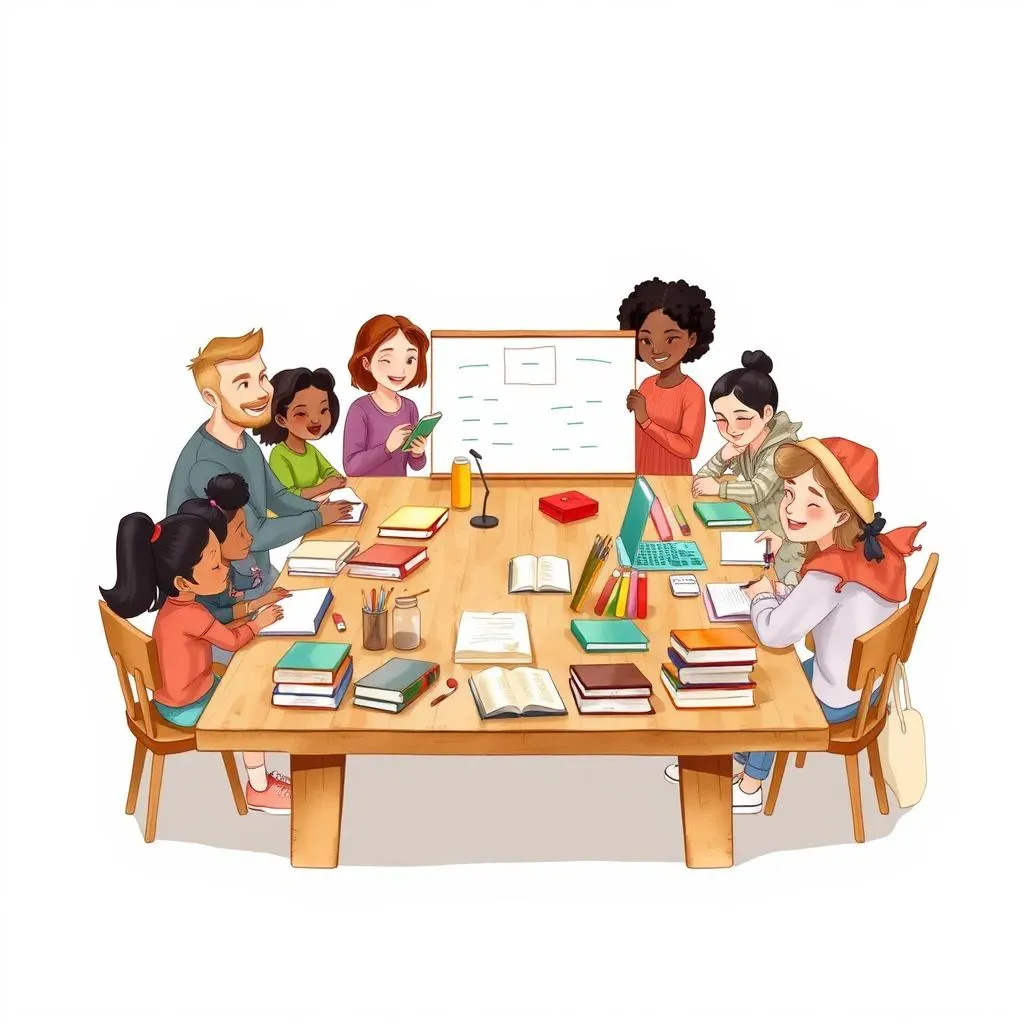Table of Contents
Are you juggling homeschool and craving connection? Maybe you've heard whispers about "co-op homeschool" and wondered, "What's the buzz?". Well, you're not alone! Many homeschooling families find themselves searching for that sweet spot where learning meets community. This article is your roadmap to understanding the world of co-op homeschool. We'll explore what it actually means to learn in a co-op setting and how it differs from other homeschool groups. We'll tackle the nitty-gritty of how these groups operate, from who takes the lead to how you can find or even start your own. So, if you're ready to discover how a co-op homeschool can enrich your educational journey, let's jump in and explore how this collaborative approach can benefit you and your family, and help your homeschool flourish.
What exactly is a Coop Homeschool?
What exactly is a Coop Homeschool?
The Basics of a Co-op
so you're thinking about co-op homeschool, right? It's basically a group of families who team up to share the homeschooling load. Imagine a bunch of parents getting together, each with their own skills and passions, and using those to teach kids. It's like a potluck, but for education. One parent might be a whiz at science, another a history buff, and someone else an art fanatic. They pool their talents and resources to create a richer learning experience for everyone's kids. This isn't about ditching your homeschool responsibilities, it's about enhancing them with a community.
More Than Just a Playdate
Now, don't confuse a co-op with just a casual playdate or a general homeschool gathering. While those are great for socializing, a co-op is more structured and focused. It's about creating a formal learning environment where kids can engage in subjects or activities they might not get at home. Some co-ops focus on specific subjects, like science or language arts, while others offer a broader range of classes and experiences. The key is the shared responsibility and the intentional approach to learning. Think of it like a mini-school, but with a strong dose of parental involvement and community spirit.
Feature | Co-op Homeschool | General Homeschool Group |
|---|---|---|
Structure | More Structured, with classes & shared teaching | Less Structured, often for socialization |
Focus | Specific subjects or activities | General support and socializing |
Parent Involvement | Active teaching or assisting | May be more hands-off |
Why Choose a Co-op?
So, why would anyone choose to join a co-op? Well, it's not for everyone, but there are some pretty compelling reasons. For starters, it helps you avoid burnout. Sharing the teaching load can be a lifesaver when you're feeling overwhelmed. Plus, it exposes your kids to different teaching styles and perspectives, enriching their learning. It's also a fantastic way to socialize, both for the kids and the parents. Homeschooling can sometimes feel isolating, but a co-op creates a built-in community. It's about learning together, growing together, and making the homeschool journey more fun and less lonely. I think it’s a win-win.
How Does a Coop Homeschool Actually Work?
How Does a Coop Homeschool Actually Work?
The Nitty-Gritty of Co-op Life
so you're intrigued by the idea of a co-op homeschool, but you're probably wondering how it all actually works, right? Well, it's not some magical, perfectly oiled machine. It’s more like a group of families figuring things out together as they go. Typically, a co-op starts with a core group of families who have similar educational goals or a shared interest. They might meet weekly, bi-weekly, or even monthly, depending on their needs and schedules. The meetings usually take place in a designated location, like a church, community center, or even someone's home. The parents then take turns leading classes or activities, based on their strengths. It's all about collaboration and flexibility.
Structure and Flexibility
The structure of a co-op can vary quite a bit. Some are very formal, with a board of directors, bylaws, and a set curriculum. Others are more laid-back, with a loose schedule and parents deciding on the fly what they want to teach. I've seen some co-ops where each parent is responsible for teaching a specific subject for the entire year, while others rotate classes every few weeks. The key is that it’s a collective effort, and everyone contributes in some way. There’s no one-size-fits-all model. It’s about finding what works best for your group and your families. It's like building a Lego castle, you start with a basic idea and build on it together.
- Formal Co-ops: Have a structured curriculum, bylaws, and a board.
- Informal Co-ops: More flexible, with parents sharing responsibilities.
- Meeting Frequency: Can be weekly, bi-weekly, or monthly.
- Location: Churches, community centers, or homes.
Parental Roles and Responsibilities
Now, let's talk about the parental involvement. In a co-op, parents aren't just dropping off their kids and going home. They are actively involved in the learning process. This could mean teaching a class, assisting in activities, or helping with administrative tasks. It's a shared responsibility, and everyone pitches in to make it work. Some co-ops even have a rotating schedule, so each parent gets a chance to teach and contribute. It’s not just about what the kids learn, it’s about the parents growing and learning together too. Remember, it's a team effort, and the more you put into it, the more you'll get out of it.
Coop vs. Homeschool Groups: What’s the Difference?
Coop vs. Homeschool Groups: What’s the Difference?
Understanding the Key Differences
so you've got the co-op concept down, but you're still scratching your head about how it's different from a regular homeschool group? I get it, they sound similar, but they're not the same beast. Think of it like this: a homeschool group is like a big, friendly gathering of families who homeschool, while a co-op is more like a team working together on a specific project. Homeschool groups are generally larger and more social, often focusing on playdates, field trips, and general support. They're great for networking and making friends, but they don't usually have the same level of structure or shared teaching responsibilities as a co-op.
Focus and Structure
The big difference really boils down to focus and structure. Homeschool groups are broader, covering a variety of interests, and they're not typically focused on specific academic goals. They’re fantastic for those who want to connect with other homeschooling families without the commitment of teaching or planning classes. A co-op, on the other hand, is more intentional. It’s about creating a learning environment that supplements what you’re already doing at home. Co-ops typically have a more defined structure, with parents taking on specific teaching roles, and a curriculum or learning plan. It's like the difference between a casual game of pickup basketball and a structured team practice. Both are fun, but one is more focused on skill-building.
Feature | Homeschool Group | Co-op Homeschool |
|---|---|---|
Size | Generally larger | Generally smaller |
Focus | Socialization, general support | Specific learning goals, shared teaching |
Structure | Less structured, more informal | More structured, with defined roles |
Parental Role | Mostly social, may help with events | Active teaching, assisting, planning |
Why it Matters
So, why does this difference even matter? Well, understanding the distinctions helps you decide what's right for your family. If you’re looking for a casual, social environment where your kids can connect with other homeschoolers and you want to meet other parents, a homeschool group might be perfect. But, if you need a more structured learning environment, where you can share teaching responsibilities and enrich your child’s education, then a co-op is the way to go. It’s all about finding the right fit for your needs and your family's style. It’s like choosing between a comfy, laid-back cafe and a focused study session at the library, both are good, but they serve different purposes.
Starting or Finding Your Coop Homeschool: A Practical Guide
Starting or Finding Your Coop Homeschool: A Practical Guide
Finding a Co-op: Your First Steps
so you're ready to jump into the co-op world, that's fantastic! But where do you even start? Finding the right co-op is like finding the perfect pair of jeans – it takes a little searching. First off, tap into your local homeschool network. Check out online databases, Facebook groups, and local homeschooling associations. These are goldmines for finding existing co-ops in your area. Don't be shy about reaching out to other homeschool families you know; they might be part of a co-op or know of one. It’s all about networking and getting the word out that you are looking. Sometimes the best opportunities are the ones you didn’t know existed.
Starting Your Own Co-op: Building From Scratch
If you can't find a co-op that fits your needs, why not start your own? It might seem daunting, but it's totally doable. Start by gathering a core group of like-minded families. Think about your goals, what subjects you want to focus on, and what kind of structure you envision. You’ll also need to figure out where you'll meet, how often, and how you'll share the teaching responsibilities. Don't worry if it's not perfect from the start, the best co-ops evolve and adapt as they go. It’s a journey of collaboration and growth. Remember, every great co-op started with a small group of people with a shared vision. It’s like planting a seed and watching it grow into a beautiful tree.
Step | Finding a Co-op | Starting a Co-op |
|---|---|---|
1 | Check local homeschool networks | Gather a core group of families |
2 | Use online databases and Facebook groups | Define your goals and focus |
3 | Reach out to homeschooling families | Plan meeting schedule and location |
4 | Visit different co-ops | Share teaching responsibilities |
Practical Considerations and Planning
Before you get too carried away, let's talk about some practical stuff. Whether you're joining or starting a co-op, you need to consider things like insurance, meeting space, and any potential costs. If you're starting your own, you might want to consider creating some basic guidelines or a co-op agreement. It doesn't have to be super formal, but it’s a good idea to have a basic understanding of how things will work. Talk about how you'll handle disagreements, what happens if someone can’t make it, and how you’ll communicate. It's all about setting clear expectations and ensuring everyone is on the same page. Remember, a little planning can go a long way in creating a successful and enjoyable co-op experience. It’s like packing a lunch for a hike, being prepared makes the adventure much more fun.
Wrapping Up Your Co-op Homeschool Journey
So, we've explored the ins and outs of co-op homeschool, from understanding what they are to figuring out how to get involved. Remember, co-ops are all about collaboration, offering a blend of social interaction, shared learning, and community support. Whether you're looking to join an existing group or feeling inspired to start your own, the key is to find a fit that works for your family's unique needs and goals. Don't be afraid to explore different options and connect with other homeschooling families – the co-op homeschool world is full of possibilities, waiting for you to discover them. The journey might have its bumps, but the benefits of learning together can be truly rewarding.